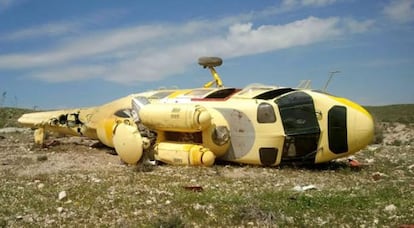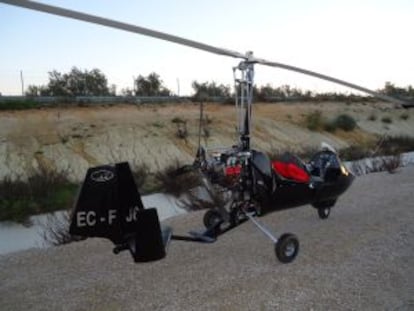The mystery of Spain’s abandoned drug helicopters
Crashed choppers that nobody wants to claim are cropping up every few months

Captain Sokol Feka was a helicopter pilot in the Albanian armed forces for 15 years. At the time of the accident he was aged 40, and employed as an instructor at the Farka military base in Albania. But his experience and skills were unable to prevent him from hitting an electricity pylon while piloting a Messerschmitt-Bölkow-Blohm BO-105 helicopter over the rocky hills of Málaga province one night in January.
Using helicopters may be more expensive, but they are also difficult to intercept” A Civil Guard spokesman
Feka was looking to make a little extra money during a holiday in Spain, but wound up dead. He and his Spanish co-pilot were thrown out of the helicopter by the impact of the crash, along with around 900 kilograms of hashish, which was scattered over the hillside. The crash led the Spanish Civil Guard to arrest 19 members of a drug-trafficking gang that was about to buy two more helicopters to ship hashish into Spain from Morocco.
Drugs traffickers are increasingly looking to the skies to move their goods. Helicopters are a particularly fast and effective way to do so, but accidents are frequent. Every four or five months, one is found in countryside somewhere along Spain’s Andalusian coastline. Investigators find no flight plan, and the crew has usually disappeared. Most significantly, the aircraft is never reported missing, even though these helicopters can cost over €500,000. The Civil Guard is currently investigating an incident in Almería province in April involving a Polish-made PZL W-3 helicopter, which is widely believed to have been carrying drugs when it went down near Níjar, in Cabo de Gata.

Flying drugs directly into Spain is costly, and requires experienced pilots able to fly at low altitude to avoid being detected by radar. The up side is that it allows drug traffickers to drop their shipments off at multiple points throughout Andalusia. “Using speedboats means stopping at the coast, but in a helicopter it is possible to cover a wider area,” says a Civil Guard spokesman. “It may be more expensive, but they are also difficult to intercept.” Drugs traffickers are now also using crop sprayers, ultra-light aircraft, and even drones.
In fact, drones are already being used in the United States to ship drugs over the border from Mexico, and the Spanish authorities say it is only a matter of time before they are widely used in Europe. The Civil Guard says it has already found a number of radio-controlled devices carrying two-kilogram loads floating in the sea off the Spanish coast. “But for this to be done on a large scale requires much bigger craft. For the moment, no drone could carry the 30-kilo load that is the norm,” says Lieutenant Colonel Andrés López, the head of Civil Guard operations in Andalusia. Sometimes, the traffickers steal light aircraft that are able to land on tiny strips and runways throughout Andalusia.
Most of the helicopters used by the drugs traffickers are secondhand, costing between €140,000 and €650,000, and often bought at auctions from the armed forces of Eastern European or North African nations. They will not have been well-maintained, which explains why there are so many accidents. A typical helicopter can carry up to 700 kilograms of drugs, along with a co-pilot, and sometimes even a few former soldiers from the Russian armed forces.
Using helicopters to ship drugs is only profitable in the medium to longer term, and they will often have to make two trips per night, but the risk of being caught is much lower than using speedboats. “The biggest difficulty we face is getting a plane or helicopter up into the air to catch them: a flight across from Morocco takes half an hour each way,” says Lt. Col López. So far, the police have seized just 900 kilograms from helicopters, and more than 50,000 kilograms from speedboats.

Sometimes, in the middle of the night, the Civil Guard’s radar detects a small aircraft crossing over from Morocco into Spanish territory. After checking that it isn’t a military flight, procedures are set in motion to intercept it. The route is checked and a helicopter is sent out to track it down. Usually, the security forces will wait until the aircraft lands. “But sometimes, the guys waiting on the ground get confused between the helicopters and start signaling to us to land,” says a Civil Guard source.
The drugs traffickers are constantly changing their routes. But they tend to cross the Strait of Gibraltar into Morocco via Algeciras and Tarifa, land, load, and then return to Spain to Cádiz and Málaga provinces. The helicopter will then be stored in a hangar or on private land until the next mission. This is when the helicopter ought to be overhauled and maintenance work carried out. But this rarely happens, which is how accidents happen.
Tu suscripción se está usando en otro dispositivo
¿Quieres añadir otro usuario a tu suscripción?
Si continúas leyendo en este dispositivo, no se podrá leer en el otro.
FlechaTu suscripción se está usando en otro dispositivo y solo puedes acceder a EL PAÍS desde un dispositivo a la vez.
Si quieres compartir tu cuenta, cambia tu suscripción a la modalidad Premium, así podrás añadir otro usuario. Cada uno accederá con su propia cuenta de email, lo que os permitirá personalizar vuestra experiencia en EL PAÍS.
¿Tienes una suscripción de empresa? Accede aquí para contratar más cuentas.
En el caso de no saber quién está usando tu cuenta, te recomendamos cambiar tu contraseña aquí.
Si decides continuar compartiendo tu cuenta, este mensaje se mostrará en tu dispositivo y en el de la otra persona que está usando tu cuenta de forma indefinida, afectando a tu experiencia de lectura. Puedes consultar aquí los términos y condiciones de la suscripción digital.









































